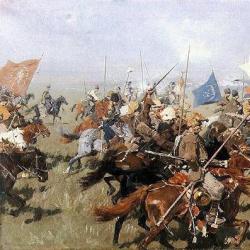Review of "The Black Swan. Under the Sign of Unpredictability", Nassim Nicholas Taleb. Book: Black Swan. Under the sign of unpredictability Taleb black swan under the sign of unpredictability
Nassim Nicholas Taleb
The Impact of the Highly Improbable
Nassim Nicholas Taleb
Black Swan
Under the sign of unpredictability
Prologue. About bird plumage9
Part I Anti-library of Umberto Eco,
or About searching for confirmations28
Chapter i. Years of teaching as an empiricist-skeptic31
Chapter 2. Eugenia's Black Swan59
Chapter h. Speculator and prostitute63
Chapter 4. A thousand and one days,
or How not to be a sucker81
Chapter 5. Proof-smacking proof!100
Chapter 6: Narrative Distortion117
Chapter 7. Life on the Threshold of Hope153
Chapter 8. Fortune's Favorite Giacomo Casanova:
problem of hidden evidence174
Chapter 9. Game error,
or the uncertainty of the "nerd"207
Part II. It is not given to us to foresee225
Chapter 10. Predictive paradox228
Chapter 11. Discovery based on bird droppings271
Chapter 12. Epistemocracy, dream310
Chapter 13. Painter Apelles,
or How to live in conditions of unpredictability 326
Part III. Gray swans of Extremistan 343
Chapter 14. From Mediocristan to Extremestan and back 345
Chapter 15. Normal distribution curve,
great intellectual deception 366
Chapter 16. Aesthetics of chance 402
Chapter 17. Locke's Madmen,
or "Gaussian curves" are out of place 432
Chapter 18. "Linden" uncertainty 449
Part IV, final 459
Chapter 19. The middle is half, or How to make ends meet
ends with the Black Swan 459
End 464
Epilogue. White swans of Eugenia 466
Dictionary 469
Bibliography 474
Dedicated to Benoit Mandelbrot, a Greek among the Romans
PROLOGUE. About bird plumage
About bird plumage
D O After the discovery of Australia, the inhabitants of the Old World were convinced that all swans were white. Their unshakable confidence was fully confirmed by experience. The sighting of the first black swan must have been a big surprise to ornithologists (and indeed anyone who is in any way sensitive to the color of a bird's feathers), but the story is important for another reason. It shows within what strict boundaries of observation or experience our learning occurs and how relative our knowledge is. A single observation can negate an axiom that has been developed over several millennia, when people admired only white swans. To refute it, one (and, they say, rather ugly) black bird was enough*.
I go beyond this logical-philosophical question into the realm of empirical reality, which has interested me since childhood. What we will call a Black Swan (with a capital B) is an event that has the following three characteristics.
Firstly, it is anomalous, because nothing in the past predicted it. Secondly, it has enormous impact. Third, human nature forces us to come up with explanations for what happened after it has happened, making an event that was initially perceived as a surprise understandable and predictable.
Let's stop and analyze this triad: exclusivity, impact and retrospective (but not forward) predictability**. These rare Black Swans explain almost everything that happens in the world, from the success of ideas and religions to the dynamics of historical events and the details of our personal lives. Since we emerged from the Pleistocene - approximately ten thousand years ago - the role of Black Swans has increased significantly. Its growth was especially intense during the Industrial Revolution, when the world began to become more complex, and everyday life - the one we think about, talk about, which we try to plan based on the news we read from newspapers - went off the beaten path.
<*Распространение камер в мобильных телефонах привело к тому, что читатели стали присылать мне изображения черных лебедей в огромных количествах. На прошлое Рож-дество я также получил ящик вина "Черный лебедь" (так себе), видеозапись (я не смотрю видео) и две книги. Уж лучше картинки. (Здесь и далее, за исключением особо оговоренных случаев, - прим. автора.)
** The expected absence of an event is also a Black Swan. Please note that according to the laws of symmetry, an extremely improbable event is the equivalent of the absence of an extremely probable event. >
Think how little your knowledge of the world would help you if, before the war of 1914, you suddenly wanted to imagine the further course of history. (Just don't fool yourself by remembering what your boring school teachers filled your head with.) For example, could you have foreseen Hitler's rise to power and a world war? And the rapid collapse of the Soviet bloc? And the outbreak of Muslim fundamentalism? What about the spread of the Internet? And what about the market crash in 1987 (and a completely unexpected revival)? Fashion, epidemics, habits, ideas, the emergence of artistic genres and schools - everything follows the “Black Swan” dynamics. Literally everything that has any significance.
The combination of low predictability and power of impact turns the Black Swan into a mystery, but that’s not what our book is about. It's mainly about our reluctance to admit that it exists! And I don’t mean just you, your cousin Joe and me, but almost all representatives of the so-called social sciences, who for more than a century have been flattering themselves with the false hope that their methods can measure uncertainty. Applying vague science to real world problems has a ridiculous effect. I have seen this happen in economics and finance. Ask your “portfolio manager” how he calculates risks. He will almost certainly give you a criterion that excludes the possibility of a Black Swan - that is, one that can be used to predict risks with about the same success as astrology (we will see how intellectual fraud is dressed up in mathematical clothes). And so it is in all humanitarian spheres.
The main point this book makes is our blindness to randomness, especially on a large scale;
Nassim Nicholas Taleb
Black Swan. Under the sign of unpredictability (collection)
Black Swan. Under the sign of unpredictability
Dedicated to Benoit Mandelbrot, a Greek among the Romans
Prologue. About bird plumage
Before the discovery of Australia, the inhabitants of the Old World were convinced that all swans were white. Their unshakable confidence was fully confirmed by experience. The sighting of the first black swan must have been a big surprise to ornithologists (and indeed anyone who is in any way sensitive to the color of a bird's feathers), but the story is important for another reason. It shows within what strict boundaries of observation or experience our learning occurs and how relative our knowledge is. A single observation can negate an axiom that has been developed over several millennia, when people admired only white swans. To refute it, one (and, they say, rather ugly) black bird was enough.
I go beyond this logical-philosophical question into the realm of empirical reality, which has interested me since childhood. What we will call a Black Swan (with a capital B) is an event that has the following three characteristics.
Firstly, it abnormal, because nothing in the past foreshadowed it. Secondly, it has enormous impact. Third, human nature forces us to come up with explanations for what happened after of how it happened, making an event initially perceived as a surprise understandable and predictable.
Let's stop and analyze this triad: exclusivity, impact and retrospective (but not forward) predictability. These rare Black Swans explain almost everything that happens in the world - from the success of ideas and religions to the dynamics of historical events and the details of our personal lives. Since we emerged from the Pleistocene - about ten thousand years ago - the role of Black Swans has increased significantly. Its growth was especially intense during the Industrial Revolution, when the world began to become more complex, and everyday life - the one we think about, talk about, which we try to plan based on the news we read from the newspapers - went off the beaten path.
Think how little your knowledge of the world would help you if, before the war of 1914, you suddenly wanted to imagine the further course of history. (Just don't fool yourself by remembering what your boring school teachers filled your head with.) For example, could you have foreseen Hitler's rise to power and a world war? And the rapid collapse of the Soviet bloc? And the outbreak of Muslim fundamentalism? What about the spread of the Internet? And what about the market crash in 1987 (and a completely unexpected revival)? Fashion, epidemics, habits, ideas, the emergence of artistic genres and schools - everything follows the “Black Swan” dynamics. Literally everything that has any significance.
The combination of low predictability and power of impact turns the Black Swan into a mystery, but that’s not what our book is about. It's mainly about our reluctance to admit that it exists! And I don’t mean just you, your cousin Joe and me, but almost all representatives of the so-called social sciences, which for more than a century have been flattering themselves with the false hope that their methods can measure uncertainty. Applying vague science to real world problems has a ridiculous effect. I have seen this happen in economics and finance. Ask your “portfolio manager” how he calculates risks. He will almost certainly call you exclusion criterion Black Swan probability - that is, one that can be used to predict risks with about the same success as astrology (we will see how intellectual fraud is dressed up in mathematical clothes). And so it is in all humanitarian spheres.
The main point this book makes is our blindness to randomness, especially on a large scale; Why do we, scientists and ignoramuses, geniuses and mediocrities, count pennies, but forget about millions? Why do we focus on the little things rather than the possible big events, despite their very obvious gigantic impact? And - if you have not yet missed the thread of my reasoning - why reading a newspaper reduces our knowledge of the world?
It is easy to understand that life is determined by the cumulative effect of a series of significant shocks. You can become aware of the role of Black Swans without leaving your chair (or bar stool). Here's a simple exercise for you. Take your own life. List significant events and technological improvements that have occurred since you were born, and compare them with how they were seen in the future. How many of them arrived on schedule? Look at your personal life, at the choice of profession or meetings with loved ones, at leaving your homeland, at the betrayals you had to face, at sudden enrichment or impoverishment. How often did these events go as planned?
What you don't know
Black Swan logic does what you don't know much more important than what you know. After all, if you think about it, many Black Swans came into the world and shook it precisely because no one was waiting for them.
Take the terrorist attacks of September 11, 2001: if this kind of danger could foresee On September 10, nothing would have happened. Fighter planes would have been patrolling around the World Trade Center towers, interlocking bulletproof doors would have been installed on the planes, and the attack would not have taken place. Dot. Something else could have happened. What exactly? Don't know.
Isn't it strange that an event happens precisely because it should not have happened? How to protect yourself from this? If you know something (for example, that New York is an attractive target for terrorists) - your knowledge is invalidated if the enemy knows that you know it. It's strange that in a strategy game like this, what you know may not matter at all.
This applies to any activity. Take, for example, the “secret recipe” for phenomenal success in the restaurant business. If it were known and obvious, someone would have already invented it and it would have become something trivial. To get ahead of everyone, you need to come up with an idea that is unlikely to occur to the current generation of restaurateurs. It should be completely unexpected. The less predictable the success of such an enterprise, the fewer competitors it has and the greater the likely profit. The same applies to the shoe business or the book business - or, in fact, to any business. The same applies to scientific theories - no one is interested in listening to platitudes. The success of human endeavors, as a rule, is inversely proportional to the predictability of their results.
Nassim Nicholas Taleb
Pages: 391
Estimated reading time: 5 hours
Year of publication: 2009
Russian language
Started reading: 6288
Description:
"Black Swan" is not an economics textbook. These are the thoughts of a very extraordinary person about life and how to find your place in it.
Over the last decade alone, humanity has experienced a number of severe shocks: September 11, 2001, the war in Ossetia, the global financial crisis. All these events, which seem natural to us now, seemed absolutely impossible until they happened. Forty-nine-year-old Lebanese, Sorbonne graduate and New York financial guru Nassim Taleb calls such unpredictable events Black Swans. He is convinced that it is they who give impetus to both history as a whole and the existence of each individual person. And to succeed, you need to know how to handle them. Immediately after the publication of this book, the author brilliantly demonstrated his “non-theory” in practice: against the backdrop of the financial crisis, Taleb’s company earned (not lost!) half a billion dollars for investors.
From Wall Street's leading heretic who stood alone against a legion of futurists and analysts, Nassim Taleb has emerged as a figure whose influence extends far beyond the financial world.
 (estimates: 2
, average: 3,00
out of 5)
(estimates: 2
, average: 3,00
out of 5)  Title: Black Swan. Under the sign of unpredictability (collection)
Title: Black Swan. Under the sign of unpredictability (collection)
Author: Nassim Nicholas Taleb
Year: 2010
Genre: Foreign educational literature, Foreign journalism, Sociology
About the book “Black Swan. Under the Sign of Unpredictability (collection)" Nassim Nicholas Taleb
The black swan is a rare bird. Just as rare and special are those severe catastrophes that could not be predicted or predicted. Lebanese Sorbonne graduate and excellent financier Nassim Taleb believes that most people are deeply mistaken in thinking that they can correctly analyze events and predict the future.
Although the term “black swan” has been used in philosophy for quite some time, it was Nassim Taleb who applied it to rare and unpredictable events that have global and societal significance. He calls such rare incidents of their kind “black swans” and believes that it is they that push the development of history as a whole and the development of each individual person, so it is important to be able to prepare for them.
His peculiar “anti-theory” encountered a wave of criticism, but he skillfully confirmed his assertions in practice. After the publication of "Black Swan", his own company, during the global financial crisis, when competitors were collapsing, was able to bring its investors about a billion dollars. However, in his work “The Black Swan” you will not find ordinary economic theories; rather, these are very interesting reflections of an unusual person about life in general and how to find your place in it.
Nassim Taleb enjoyed a successful career on Wall Street before becoming fascinated by the epistemology of chance and focusing on his own mapping project. He began to study the problems of surviving in a world that we do not understand and dealing with the unknown and the random. He considers himself an "empirical skeptic", believing that all financial and economic specialists and scientists overestimate the capabilities of the usual, rational approach to explaining static data and do not notice the influence that inexplicable randomness has on statistics.
The merits of Nassim Taleb have been repeatedly noted by various experts. Thus, The Times magazine named Taleb the most outstanding modern thinker in the world, and Daniel Kahneman (Nobel laureate) went even further, proposing to add his name to the list of the best representatives of the intelligentsia, because he boldly analyzed the way people try to understand unpredictable things. And these are not all the brilliant reviews of his works. Readers will find it interesting and useful to learn how the author questions our dependence on misconceptions when we use the causes of events to analyze, when history is actually “silent.” This silence is the missing energy in the historical system that the black swan produces.
The collection “Black Swan” includes Taleb’s best statements, which represent the quintessence of his unique ideas.
On our website about books you can download the site for free without registration or read online the book “Black Swan. Under the sign of unpredictability (collection)" Nassim Nicholas Taleb in epub, fb2, txt, rtf, pdf formats for iPad, iPhone, Android and Kindle. The book will give you a lot of pleasant moments and real pleasure from reading. You can buy the full version from our partner. Also, here you will find the latest news from the literary world, learn the biography of your favorite authors. For beginning writers, there is a separate section with useful tips and tricks, interesting articles, thanks to which you yourself can try your hand at literary crafts.
Quotes from the book “Black Swan. Under the Sign of Unpredictability (collection)" Nassim Nicholas Taleb
The newest disease is to take the unobservable for the non-existent; But we are also infected with the worst craze - to mistake the unobservable for the unobservable in general.
If in the morning you know with any degree of accuracy how your day will turn out, then you are a little bit dead, and the more accurate your knowledge, the deader you are.
Pharmaceutical companies are better at inventing diseases that fit existing drugs than inventing drugs that fit existing diseases.
Education makes a wise man only a little wiser, but a fool immeasurably more dangerous.
The only objective definition of old age: it begins when a person begins to talk about old age.
Nassim Nicholas Taleb
The Impact of the Highly Improbable
Nassim Nicholas Taleb
Black Swan
Under the sign of unpredictability
Prologue. About bird plumage9
Part I Anti-library of Umberto Eco,
or About searching for confirmations28
Chapter i. Years of teaching as an empiricist-skeptic31
Chapter 2. Eugenia's Black Swan59
Chapter h. Speculator and prostitute63
Chapter 4. A thousand and one days,
or How not to be a sucker81
Chapter 5. Proof-smacking proof!100
Chapter 6: Narrative Distortion117
Chapter 7. Life on the Threshold of Hope153
Chapter 8. Fortune's Favorite Giacomo Casanova:
problem of hidden evidence174
Chapter 9. Game error,
or the uncertainty of the "nerd"207
Part II. It is not given to us to foresee225
Chapter 10. Predictive paradox228
Chapter 11. Discovery based on bird droppings271
Chapter 12. Epistemocracy, dream310
Chapter 13. Painter Apelles,
or How to live in conditions of unpredictability 326
Part III. Gray swans of Extremistan 343
Chapter 14. From Mediocristan to Extremestan and back 345
Chapter 15. Normal distribution curve,
great intellectual deception 366
Chapter 16. Aesthetics of chance 402
Chapter 17. Locke's Madmen,
or "Gaussian curves" are out of place 432
Chapter 18. "Linden" uncertainty 449
Part IV, final 459
Chapter 19. The middle is half, or How to make ends meet
ends with the Black Swan 459
End 464
Epilogue. White swans of Eugenia 466
Dictionary 469
Bibliography 474
Dedicated to Benoit Mandelbrot, a Greek among the Romans
PROLOGUE. About bird plumage
About bird plumage
D O After the discovery of Australia, the inhabitants of the Old World were convinced that all swans were white. Their unshakable confidence was fully confirmed by experience. The sighting of the first black swan must have been a big surprise to ornithologists (and indeed anyone who is in any way sensitive to the color of a bird's feathers), but the story is important for another reason. It shows within what strict boundaries of observation or experience our learning occurs and how relative our knowledge is. A single observation can negate an axiom that has been developed over several millennia, when people admired only white swans. To refute it, one (and, they say, rather ugly) black bird was enough*.
I go beyond this logical-philosophical question into the realm of empirical reality, which has interested me since childhood. What we will call a Black Swan (with a capital B) is an event that has the following three characteristics.
Firstly, it is anomalous, because nothing in the past predicted it. Secondly, it has enormous impact. Third, human nature forces us to come up with explanations for what happened after it has happened, making an event that was initially perceived as a surprise understandable and predictable.
Let's stop and analyze this triad: exclusivity, impact and retrospective (but not forward) predictability**. These rare Black Swans explain almost everything that happens in the world, from the success of ideas and religions to the dynamics of historical events and the details of our personal lives. Since we emerged from the Pleistocene - approximately ten thousand years ago - the role of Black Swans has increased significantly. Its growth was especially intense during the Industrial Revolution, when the world began to become more complex, and everyday life - the one we think about, talk about, which we try to plan based on the news we read from newspapers - went off the beaten path.
<*Распространение камер в мобильных телефонах привело к тому, что читатели стали присылать мне изображения черных лебедей в огромных количествах. На прошлое Рож-дество я также получил ящик вина "Черный лебедь" (так себе), видеозапись (я не смотрю видео) и две книги. Уж лучше картинки. (Здесь и далее, за исключением особо оговоренных случаев, - прим. автора.)
** The expected absence of an event is also a Black Swan. Please note that according to the laws of symmetry, an extremely improbable event is the equivalent of the absence of an extremely probable event. >
Think how little your knowledge of the world would help you if, before the war of 1914, you suddenly wanted to imagine the further course of history. (Just don't fool yourself by remembering what your boring school teachers filled your head with.) For example, could you have foreseen Hitler's rise to power and a world war? And the rapid collapse of the Soviet bloc? And the outbreak of Muslim fundamentalism? What about the spread of the Internet? And what about the market crash in 1987 (and a completely unexpected revival)? Fashion, epidemics, habits, ideas, the emergence of artistic genres and schools - everything follows the “Black Swan” dynamics. Literally everything that has any significance.
The combination of low predictability and power of impact turns the Black Swan into a mystery, but that’s not what our book is about. It's mainly about our reluctance to admit that it exists! And I don’t mean just you, your cousin Joe and me, but almost all representatives of the so-called social sciences, who for more than a century have been flattering themselves with the false hope that their methods can measure uncertainty. Applying vague science to real world problems has a ridiculous effect. I have seen this happen in economics and finance. Ask your “portfolio manager” how he calculates risks. He will almost certainly give you a criterion that excludes the possibility of a Black Swan - that is, one that can be used to predict risks with about the same success as astrology (we will see how intellectual fraud is dressed up in mathematical clothes). And so it is in all humanitarian spheres.
The main point this book makes is our blindness to randomness, especially on a large scale;





